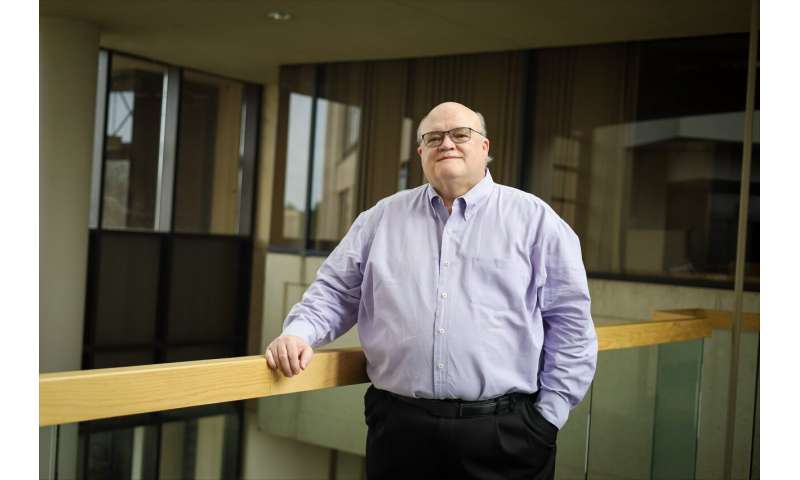Dr. Robert Kesterson Working to Advance Knowledge of Neurofibromatosis Development and Treatment

May is Neurofibromatosis Awareness Month
Neurofibromatosis type 1, a genetic condition that causes tumors to grow along nerves, occurs in 1 in 3,000 to 4,000 people worldwide. Although the tumors are usually benign, they can cause blindness, deafness, disfigurement, bone abnormalities, learning disabilities, and disabling pain. Neurofibromatosis 1, more commonly called NF1, is also associated with an increased risk of other tumors including leukemia, glioblastoma, and breast cancer.
There is no cure for NF1, and until very recently, there were no specific therapies beyond treating the individual symptoms with chemotherapy and radiation, bracing or surgery, and pain medications and alternative therapies. May has been designated as NF Awareness Month, to bring more attention and education toward Neurofibromatosis.
Dr. Robert (Bob) Kesterson is Professor of Cancer Precision Medicine and Director of the Genetically Engineered Models, or GEMS, core facility at the Pennington Biomedical Research Center. Families from all over the world with children diagnosed with NF1 reach out to him in hopes of developing the best therapy for treating their child's specific genetic mutation.
"NF1 is caused by multiple mutations in the NF1 gene. When I first began studying NF1, there were no treatments. Today, there is a drug called a MEK inhibitor that reduces symptoms in some patients. It doesn't work for all patients, so we need to work to develop additional therapeutics," Dr. Kesterson said. "One issue with NF1 is that the gene is very large and there are so many different mutations, with over 7,000 mutations already known."
With sustained support from the Gilbert Family Foundation—over $10 million in recent years—Dr. Kesterson has been working on multiple ways to target and edit NF1 genetic typos. NF1 animal models help uncover the underlying process of the disease, which can lead to new treatments, and often extremely individualized treatments, to better manage the disease in a patient. Dr. Kesterson estimates that he has created between 300 and 500 animal models for unique diseases within the last 20 years.
Dr. Kesterson's lab is examining molecular mechanisms associated with the NF1 gene since it is a tumor suppressor gene associated with many types of cancers. He specializes in creating personalized animal models that mimic a patient's specific genetic mutations, which hold the promise of uniquely tailoring therapies to either correct a particular mutation at the DNA level or provide the missing protein back to the tumor cells growing abnormally.
Support from NIH is focused on mechanisms involved with novel animals created by his lab that spontaneously produce mammary tumors due to NF1 gene defects to understand the role that has is breast cancer where recent clinical genetic studies indicate that as many as 1-in-3 breast cancer patients have acquired a "hit" or mutation in one copy of the NF1 gene. This month, one of Dr. Kesterson's graduate students, Mrs. Alexis Stillwell, was funded by the Children's Tumor Foundation, or CTF, with a Young Investigator Award for her proposal focused on developmental skeletal defects found in a novel mouse that recapitulates a "mild" NF1 mutation found in patients.
"Coming to LSU and Pennington Biomedical after working at centers for the National Cancer Institute at Vanderbilt University and the University of Alabama at Birmingham for over 25 years was a natural fit since there are numerous connections between my cancer research and metabolism, where Pennington Biomedical is a leader," Kesterson said.
Dr. Kesterson's work extends beyond NF1. He has created mouse models for patients with diseases such as cystic fibrosis, polycystic kidney disease, diabetes, cardiovascular disease, blindness, and many types of cancer.
The kind of personalized gene rescue Dr. Kesterson is able to do relies on increasingly affordable genetic sequencing and can make the difference between life and death for people with rare diseases.
He said technological advances in the last six years have made it much easier to provide true precision medicine and have opened up the rapid development of animals beyond just mice.
"Genetically engineered models represent one of the best ways we can help individuals with a unique disease because we can look at the specific mechanisms. We can identify the specific gene and then identify what about that gene is leading to the disease. Where is the protein? Where is the mutation? What bonds can be disrupted? Some genes have been studied clinically for a very long time, but patients have different phenotypes," he said. "This process used to take a long time using mouse stem cells. With the development of CRISPR technology, it is much easier and quicker to make changes in the genome."
Dr. Kesterson believes his work will ultimately lead to the ability to restore partial function of the gene associated with NF1, thereby reducing the growth of tumors and other symptoms of the disease. He is not alone in thinking his work holds tremendous promise. He has significant funding from both federal sources and many families with children diagnosed with NF1 who are passionate about supporting efforts to find new treatments and eventually, a cure.
"Dr. Kesterson is a world leader in both cancer precision medicine and genetically engineered models," said Dr. John Kirwan, Pennington Biomedical executive director. "As Louisiana works toward a National Cancer Institute designation, the work of researchers like Dr. Kesterson and others focused on cancer and related diseases will be instrumental in contributing to building the critical mass necessary to bring cutting-edge cancer care to those in our state."
Provided by Louisiana State University